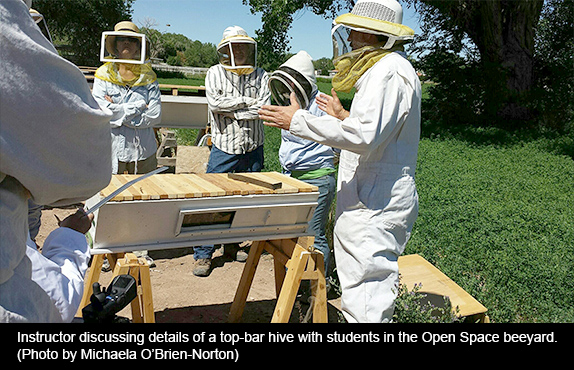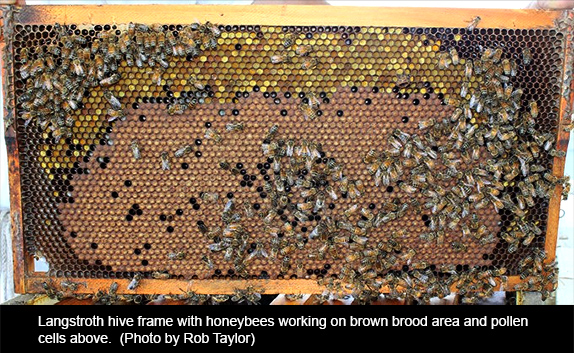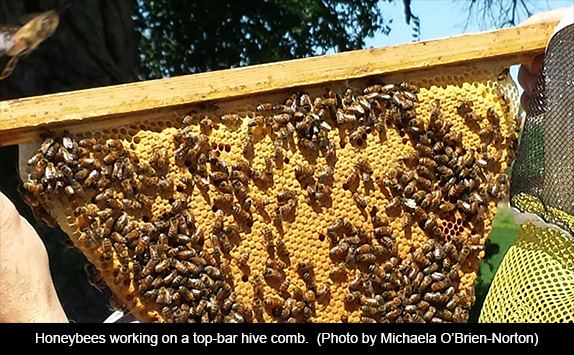
The Certified Beekeepers Apprentice Program, new in 2014, launched in May and ended in August. All 24 adult students successfully completed the seven all-day sessions of year one. The two-year program was developed with assistance from the New Mexico Beekeepers Association, the City of Albuquerque Open Space Division and Washington State Beekeepers Association and was held at the Open Space Visitor Center on Coors Blvd. NW, Albuquerque.
One of the students, Anita Amstutz, enrolled in the program because, as she says, “I became fascinated by bees when a feral swarm moved in two houses away in my neighborhood. I began keeping bees the next year. With the many ups and downs and sometimes downright ‘pickles’ of beekeeping, I jumped at the chance to take the Certified Beekeeper course. My goal was to go back and recoup the basics of beekeeping—this time with others, rather than alone in front of my computer. I also wanted to find some beekeeping buddies.”
The enrolled group of students included experienced beekeepers, like Anita, intending to expand their knowledge of beekeeping, novices with less than a year of beekeeping experience, and others who did not own hives and wanted to learn about honeybees and beekeeping before deciding whether to pursue their interest and invest in the necessary beekeeping equipment.
“When I started the class, I had no idea what I was in for,” said Marlene Brown, another of the 24 first-year students. About two years prior to enrolling in the Certified Beekeepers program, Brown built a top-bar bee hive in a class offered in the community, but she didn’t have any bees for the hive. Twice, a friend brought her a swarm, but neither swarm stayed. In a determined effort to get her hive started, she bought a package of bees but still didn’t know how to manage them. She spoke with long-time Albuquerque beekeeper, T.J. Carr, who encouraged her to participate in the new Certified Beekeepers program. At first, she didn’t realize she had signed up for an intensive program that would span several months of two years. “Once I found out more about the classes, I was excited to be part of the program. I went from being scared around the bees to being comfortable. It has been a great experience learning about bees and talking to folks about their different experiences. I now have two hives and have done a trap-out. I’m looking forward to next year’s classes.”
Allan Emord, another student in the Certified Beekeepers program, was impressed with the “immense amount of information that was presented by very knowledgeable and experienced beekeepers.” Classes were taught by local beekeepers and instructors in related fields and covered the essentials of beekeeping. Instructors demonstrated tools and equipment, showed descriptive slides, recommended books, and explained the best practices of urban beekeeping.
Students learned about Langstroth and top-bar hives, types of honeybees and their respective characteristics, protective clothing and equipment, establishing hives in an urban neighborhood, swarms, seasonal hive inspection and management, botany and pollinators, hive pests and diseases, an overview of queen-bee rearing, honey production and harvesting, wax processing, marketing and selling honey, and bee-venom therapy (called apitherapy). In addition to the required classroom instruction, each session included supervised hands-on time with the live hives at the Open Space Visitor Center beeyard.

After completing the coursework of the first year, Amstutz reflected on her reasons for enrolling in the program and said, “I was not disappointed. Each class was taught by veteran beekeepers, who kept us wide awake with their stories and knowledge. Working the hives was an opportunity to become acquainted with my fellow beekeepers and get our hands in the hives.” Referring to her appreciation for the hardworking honeybees, she said, “I want to humbly learn from my clever little friends and care for them, since I benefit so much from their gifts.”
To become certified, students are required to complete 40 hours of volunteer work in community service. During the summer, students could be found volunteering at the Open Space Visitor Center for special pollinator events, working the honeybee-exhibit table at the New Mexico State Fair, hosting the registration table at monthly Albuquerque Beekeepers meetings, teaching elementary school children about honeybees, assisting in honeybee trap-outs or cut-outs, and other bee-related volunteer opportunities.
The eight-member, volunteer program-planning committee generously dedicated ample hours, energy, and creativity into developing a beekeeping-education program worthy of certification. They established curriculum requirements, planned the schedule of sessions that spanned three months, developed a full-color, comprehensive handbook that included instructive photographs and illustrations, and recruited experienced instructors.
The program was developed to achieve six specific objectives: consistent training in the best practices of backyard beekeeping; development of healthy, gentle hives suitable for an urban environment; community education and outreach; mentoring access for beekeepers; volunteers for community hives; and streamlined approach for managing swarms.

“I loved the whole experience of the Certified Beekeepers program,” student Tom Day said after completing the requirements of the first year. “The knowledge of the teachers and their own personal experiences were a great asset to learning and enjoying the class. It all helped to build confidence, to plow forward and learn more and enjoy keeping bees.”
During the final hour of the seventh session, students and members of the planning committee held a celebratory party, so the students could each receive a Year 1 Certificate of Completion, enjoy a delicious lunch provided by the committee, and taste samples of honey from many personal hives.
The 2015 Certified Beekeepers program is scheduled to start in early spring. Year 1 students will follow a curriculum similar to the 2014 program. Saturday sessions are planned for March 28, April 18, May 9, May 30, June 13, July 11 and August 1.
Year 2 students will spend most of their program time working at live hives, with supervision, in the beeyards of experienced beekeepers or at the Open Space Visitor Center beeyard. The program is flexibly designed to offer core content that includes queen rearing, hive splits and maintenance on Langstroth and top-bar hives, and bee horticulture, as well as elective classes such as requeening, cutouts and trapouts, value-added bee products, hive woodworking, and monetizing beekeeping, to allow students to focus on their particular areas of interest as they relate to honeybees. Each year-2 student will maintain a honeybee journal, noting specific experiences, knowledge gained, and personal highlights of the coursework and give a short presentation to the group at the last session.
Anyone interested in learning more about the Certified Beekeepers Apprentice Program may visit the New Mexico Beekeepers Association website or contact the .(JavaScript must be enabled to view this email address) (me).



Responses to “Certified Beekeepers Apprentice Program: A First in New Mexico”